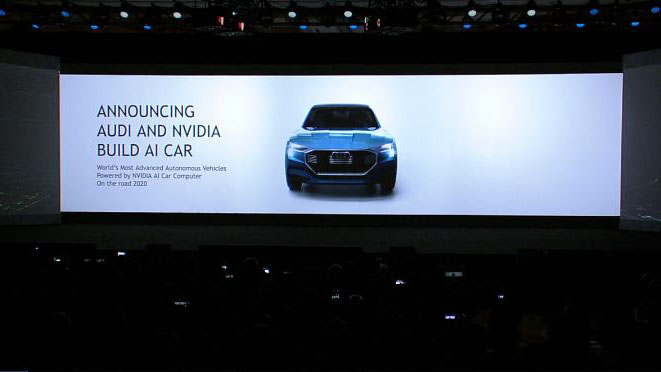Nvidia and Audi plan to have an autonomous car on the road by 2020
AI cars are coming, and soon

At its CES 2017 keynote, Nvidia showed off the progress it’s been making in field of autonomous driving, including an announcement that it would be working with Audi to bring an autonomous car to the road by 2020.
Additionally the company showed off a new co-pilot mode for its autonomous technology.
Nvidia said that its work has been motivated by the waste in the transportation industry, both in terms of pollution, lives lost due to accidents, and parked cars wasting space.
Deep car learning
The progress has been enabled by new ‘Deep Learning’ processes to understand and recognise minor differences in the environment in addition to the computational power offered by the 8-core Xavier ARM64 CPU.
Nvidia used the keynote to show a video of its (non-Audi) BB8 self-driving car, which was able to perform such actions as merging onto a freeway, in addition to understanding voice-activated directions.
Interestingly the technology will be able to establish its confidence levels on different parts of the journey, allowing it to be fully autonomous at some moments, and act as more of a co-pilot in other moments.
In its co-pilot mode, the car will perceive threats while the user is driving manually. This means it will be able to inform the driver of dangers, such as fast-moving motorcyclists, that the user might not be aware of, enhancing their knowledge of their surroundings.
Sign up for breaking news, reviews, opinion, top tech deals, and more.
The AI will even be able to read the body language and perform facial recognition on the driver, allowing it to understand where the driver is looking, and give advice accordingly.
The GPU manufacturer also announced it was working with several mapping companies, including TomTom and Baidu (which has mapped China’s roads), and it also announced that the manufacturer Bosch will be partnering to integrate the new technology.
- Check out all the latest news from CES 2017.

Jon Porter is the ex-Home Technology Writer for TechRadar. He has also previously written for Practical Photoshop, Trusted Reviews, Inside Higher Ed, Al Bawaba, Gizmodo UK, Genetic Literacy Project, Via Satellite, Real Homes and Plant Services Magazine, and you can now find him writing for The Verge.